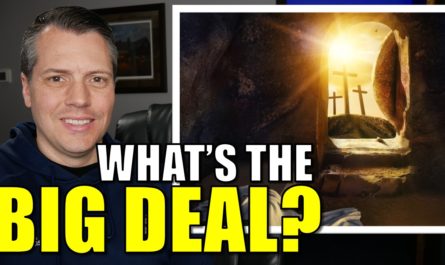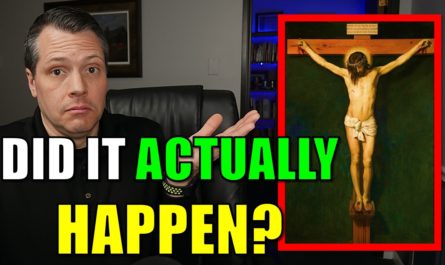Probably the most foundational belief that we have as Christians is the resurrection of Jesus Christ. With it we have everything; without it we have nothing.
A resurrection is, of course, a miracle. It defies everything we know about life and nature. But the resurrection of Jesus is even more miraculous because it includes the element of prophecy.
We can predict all kinds things about ourselves. When I play an Xbox game with one of my kids, we engage in brutal trash talk. “You’re going down tonight!” “I’m going to beat you so badly you won’t ever want to show your face in public again!” I really do not know that I am going to win, but I predict it nonetheless. Sure, I’m usually wrong, but occasionally I get lucky and pull off a win.
In my case, it’s a prediction (or maybe wishful thinking) rather than a prophecy. A prediction is making an educated guess, but a prophecy is seeing into the future.
Jesus did not merely predict His resurrection. After all, there were no odds in His favor. Rather, He prophesied it. His resurrection had no 50/50 probability. It was impossible. From man’s point of view, anyway.
It’s one thing to rise from the dead. However, it’s an entirely different thing to announce it beforehand! But that is exactly what Jesus did.
From that time Jesus began to show to His disciples that He must go to Jerusalem, and suffer many things from the elders and chief priests and scribes, and be killed, and be raised the third day. (Matthew 16:21)
He did not simply predict His resurrection. He described when, where, and how it would happen!
As Matthew reflected back on this, he was probably thinking, “Why didn’t I get it? How could I miss what Jesus told us so plainly?” But, at the time, it did not seem so clear to the disciples. After all, if one of your friends mentioned something about coming back to life, you might think you misheard them.
Peter also missed it. Apparently, he only heard half of what Jesus said—the part about dying, and he was not about to let that happen.
Then Peter took Him aside and began to rebuke Him, saying, “Far be it from You, Lord; this shall not happen to You!” (Matthew 16:22)
But Jesus knew that Peter did not grasp what He was saying.
But He turned and said to Peter, “Get behind Me, Satan! You are an offense to Me, for you are not mindful of the things of God, but the things of men.” (Matthew 16:23)
If Peter had been listening more intently, he might have realized that, yes, Jesus would be killed, but He would rise again. This was necessary, and Peter could do nothing to prevent it.
Jesus also predicted His resurrection at other times. Let’s look at a few places where it is recorded.
Now as they came down from the mountain, Jesus commanded them, saying, “Tell the vision to no one until the Son of Man is risen from the dead.” (Matthew 17:9)
Now while they were staying in Galilee, Jesus said to them, “The Son of Man is about to be betrayed into the hands of men, and they will kill Him, and the third day He will be raised up.” And they were exceedingly sorrowful. (Matthew 17:22-23)
Now Jesus, going up to Jerusalem, took the twelve disciples aside on the road and said to them, “Behold, we are going up to Jerusalem, and the Son of Man will be betrayed to the chief priests and to the scribes; and they will condemn Him to death, and deliver Him to the Gentiles to mock and to scourge and to crucify. And the third day He will rise again.” (Matthew 20:17-19)
And when they had sung a hymn, they went out to the Mount of Olives. Then Jesus said to them, “All of you will be made to stumble because of Me this night, for it is written: ‘I WILL STRIKE THE SHEPHERD, AND THE SHEEP OF THE FLOCK WILL BE SCATTERED.’ But after I have been raised, I will go before you to Galilee.” (Matthew 26:30-32)
So the Jews answered and said to Him, “What sign do You show to us, since You do these things?” Jesus answered and said to them, “Destroy this temple, and in three days I will raise it up.” Then the Jews said, “It has taken forty-six years to build this temple, and will You raise it up in three days?” But He was speaking of the temple of His body. (John 2:18-21)
When Jesus prophesied His resurrection, His friends did not get it. It just did not make sense to them. However, after He resurrected, it all started coming together. When the women showed up at the tomb and saw no body, an angel announced that He was risen, and reminded them of His words:
He is not here, but is risen! Remember how He spoke to you when He was still in Galilee, saying, ‘The Son of Man must be delivered into the hands of sinful men, and be crucified, and the third day rise again.’ And they remembered His words. (Luke 24:6-8)
John also had to eat some crow.
Jesus answered and said to them, “Destroy this temple, and in three days I will raise it up.” Then the Jews said, “It has taken forty-six years to build this temple, and will You raise it up in three days?” But He was speaking of the temple of His body. Therefore, when He had risen from the dead, His disciples remembered that He had said this to them; and they believed the Scripture and the word which Jesus had said. (John 2:19-22)
Remember that John’s purpose for writing his book was so we can know we have eternal life. This is one way he proved the message—by informing us that while the disciples did not fully believe Jesus at first, they were convinced not only by His resurrection, but by the fact that He prophesied it Himself. There was no question in their minds after that, and their lives changed because of it. Suddenly nothing else mattered.



